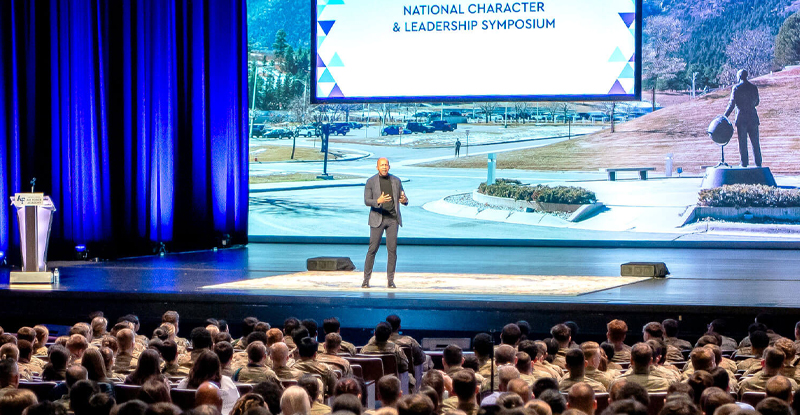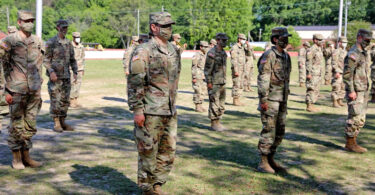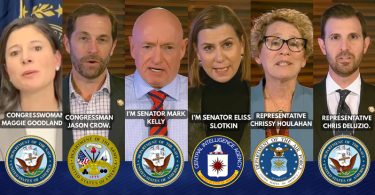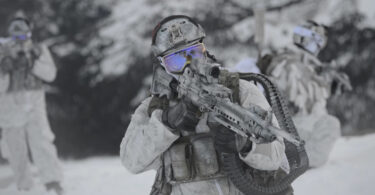Rather awkward press release from USAFA in light of what an anarchist Airman did this week in DC “in the name of justice”.
( USAFA Press Release) Equal Justice Initiative founder Bryan Stevenson told his Colvin Lecture audience at the 31st annual National Character and Leadership Development Symposium that the nation needs leaders prepared to do what’s “uncomfortable and inconvenient” in the name of justice.
Stevenson said leaders must also identify with the struggles of those they lead in his “American Injustice: Mercy, Humanity and Making a Difference” NCLS keynote Feb. 21.
Today’s leaders need a ‘compassionate identity’
“Our nation needs leaders to be compassionate and create an identity that allows people to understand that they are committed to their well-being,” Stevenson said. “When we create identities that are rooted in compassion, that means something to the people around us. We can say things that other people can’t say, and we can inspire things that other people cannot inspire.”
Empowered by example
One attendee, Cadet 3rd Class Kirsten Cannon, said she hopes to follow Stevenson as an example of the impact of change she hopes to make. Cannon, a Foreign Area Studies-History major with a double minor in French and Diversity and Inclusion Studies, said she grew up in a broken home but feels empowered by his work.
“Bryan Stevenson’s work reminds me that it’s not about the cards you were dealt but the strategic moves you choose to make with what you have at your disposal.” Cannon said.
“Another thing that empowers me about his legacy is that kindness isn’t always afforded to everyone. If we could get to a point where we make extending kindness a part of our culture, it could empower many people.”
(STARRS NOTE: This is nice, but in the Great Power Competition when you’re up against the PRC military, how does this work as someone trained to be a warfighter for the United States military?)
Leadership with ‘identity’ in the military
To be an effective leader, Stevenson promotes establishing an effective identity.
“You can be a military leader,” said Stevenson. “But if you are not the kind of leader that inspires people around you to trust you, to believe you, to understand that you are committed to their wellbeing, you will be less effective.”
During Cannon’s prior enlisted career before her Academy appointment, such a leader gave her the direction and inspiration that she needed. Cannon hopes to be that type of leader when she becomes an officer, she said. Stevenson inspires her to be a leader with high emotional capacity.
“I encourage my friends to be compassionate for those around them,” Cannon said. “People may not remember the things you did and said, but they will always remember the way you made them feel. The best leaders are the ones who are attentive to your needs even if you don’t exactly know how to express where you are lacking.”
An effective leader’s identity
Young officers should strive to achieve this identity, Stevenson said. “To be an effective leader, you have to have an identity that means something to the people around you,” Stevenson said. “It’s not your rank, it’s not your title, it’s not even that you’re a graduate of this prestigious Academy. It’s the kind of identity comes from the words that people use when they describe how you are, what you do.”
In 1989, Stevenson founded the Equal Justice Initiative in Montgomery, Alabama, and serves as its executive director. Under his leadership, the human rights organization won major legal challenges that eliminated excessive and unfair sentencing. EJI also exonerated innocent death row prisoners and helped children who were prosecuted as adults. He argued and won multiple landmark U.S. Supreme Court cases. A 2019 decision protects condemned prisoners who suffer from dementia, and a landmark 2012 case banned mandatory life imprisonment without parole sentences for children under 18.
“It was an honor to have Mr. Bryan Stevenson deliver the Colvin Keynote Lecture at this year’s NCLS,” said Mrs. Gail Colvin, Academy Director of Staff. “Mr. Stevenson leads with action standing for what’s right, even when it is uncomfortable or inconvenient. A true leader of character, he challenges us all to be effective leaders by being proximate to the people we lead and serve to create positive impact.”
See photos of the National Character and Leadership Symposium on Flickr.
His website: https://eji.org/
Their homepage has a “History of Racial Injustice Daily Calendar” where you then “Share this injustice” of the day with your friends on social media.
Under their “Racial Justice” page, “We share America’s history of racial injustice, from enslavement, racial terror lynchings, and segregation to mass incarceration.”
“American history begins with the creation of a myth to absolve white settlers of the genocide of Native Americans: the false belief that nonwhite people are less human than white people. This belief in racial hierarchy survived slavery’s abolition, fueled racial terror lynchings, demanded legally codified segregation, and spawned our mass incarceration crisis. The dehumanizing myth of racial difference endures today because we don’t talk about it.”
Does this type of deep hatred for America spawn people like the Airman in DC?








Leave a Comment